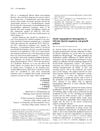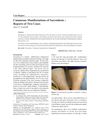 119 citations,
October 1992 in “Fundamental & Clinical Pharmacology”
119 citations,
October 1992 in “Fundamental & Clinical Pharmacology” Potassium channel openers could help treat cardiovascular diseases and asthma but require better targeting to specific tissues for effective use.
[object Object] 2 citations,
July 2023 in “Animals” FGF10 and non-coding RNAs are important for cashmere goat hair follicle development.
 8 citations,
August 2007 in “Histopathology”
8 citations,
August 2007 in “Histopathology” Different growth patterns in thyroid tumors are influenced by where cell growth and death occur.
 134 citations,
December 2018 in “Dermatology and Therapy”
134 citations,
December 2018 in “Dermatology and Therapy” Some vitamins and minerals like vitamin D and iron can help with certain types of hair loss, but more research is needed for others.
 10 citations,
June 2011 in “Movement Disorders”
10 citations,
June 2011 in “Movement Disorders” THAP1 gene changes do not affect DYT1 dystonia; finasteride may help reduce tics and OCD in Tourette syndrome.
 1 citations,
October 2006 in “Journal of Family Planning and Reproductive Health Care”
1 citations,
October 2006 in “Journal of Family Planning and Reproductive Health Care” The contraceptive implant Implanon may be linked to hair loss, but the reported case of alopecia could be unrelated to the implant.
 46 citations,
May 2009 in “Maturitas”
46 citations,
May 2009 in “Maturitas” Taking DHEA for a year is generally safe for postmenopausal women but may cause acne and more facial hair without improving metabolism or aging.
 38 citations,
May 2006 in “Archives of Gynecology and Obstetrics”
38 citations,
May 2006 in “Archives of Gynecology and Obstetrics” Women with only irregular periods or excess hair have a better hormone profile than those with full PCOS, but both groups are similar, indicating a need for better PCOS diagnosis methods.
 March 2017 in “BIRDEM Medical Journal”
March 2017 in “BIRDEM Medical Journal” Sarcoidosis can cause various skin issues, making diagnosis difficult.
 15 citations,
November 2019 in “Cutaneous and Ocular Toxicology”
15 citations,
November 2019 in “Cutaneous and Ocular Toxicology” Minoxidil tretinoin liposomal based hydrogel shows promise for effective treatment of hair loss by delivering both drugs at the same time.
 49 citations,
January 1994 in “The Journal of Steroid Biochemistry and Molecular Biology”
49 citations,
January 1994 in “The Journal of Steroid Biochemistry and Molecular Biology” RU 58841 may treat acne, hair loss, and excessive hair growth.
 397 citations,
February 2004 in “British Journal of Dermatology”
397 citations,
February 2004 in “British Journal of Dermatology” Minoxidil boosts hair growth by opening potassium channels and increasing cell activity.
 April 2023 in “International journal of research in Ayurveda and pharmacy”
April 2023 in “International journal of research in Ayurveda and pharmacy” Ayurvedic treatment improved symptoms and reduced TSH levels in a hypothyroidism patient.
 14 citations,
May 2022 in “Asian Journal of Pharmaceutical Sciences”
14 citations,
May 2022 in “Asian Journal of Pharmaceutical Sciences” New hair follicle-targeting treatments show promise for hair disorders but need more research on safety and effectiveness.
 11 citations,
February 2013 in “Clinical Endocrinology”
11 citations,
February 2013 in “Clinical Endocrinology” A small number of premenopausal female blood donors had high prolactin levels, often due to stress, and retesting is recommended to prevent misdiagnosis.
 20 citations,
January 2008 in “Reproductive Biomedicine Online”
20 citations,
January 2008 in “Reproductive Biomedicine Online” Sexual orientation does not affect the prevalence of PCOS or fertility rates in women undergoing artificial donor insemination.
 2 citations,
March 2021 in “Journal of Cosmetic Dermatology”
2 citations,
March 2021 in “Journal of Cosmetic Dermatology” Umbilical cord-derived media is safe and effective for hair growth.
 August 2024 in “Drug Design Development and Therapy”
August 2024 in “Drug Design Development and Therapy” Decursin shows promise for treating cancer, neuroprotection, inflammation, and hair loss.
 38 citations,
February 2009 in “Journal of The European Academy of Dermatology and Venereology”
38 citations,
February 2009 in “Journal of The European Academy of Dermatology and Venereology” Severe vertex pattern hair loss may indicate a higher risk for artery plaque buildup.
 April 2006 in “Current Opinion in Endocrinology & Diabetes”
April 2006 in “Current Opinion in Endocrinology & Diabetes” Testosterone therapy can help improve sexual function, mood, and bone density in women with low androgen levels, but more research is needed on long-term safety.
 58 citations,
January 2003 in “Thrombosis and Haemostasis”
58 citations,
January 2003 in “Thrombosis and Haemostasis” Testosterone may slow down wound healing and increase inflammation.
 9 citations,
June 2002 in “Best Practice & Research in Clinical Obstetrics & Gynaecology”
9 citations,
June 2002 in “Best Practice & Research in Clinical Obstetrics & Gynaecology” Testosterone therapy can help women with androgen deficiency by improving energy, sex drive, and bone health with few side effects.
1 citations,
June 2015 in “Journal of anatomy” A compound named ZCZ90 can increase muscle spindle firing, potentially helping treat muscle spasms and hypertension.
 15 citations,
November 2020 in “Pharmaceutics”
15 citations,
November 2020 in “Pharmaceutics” Tofacitinib nanoparticles can safely and effectively treat alopecia areata by targeting hair follicles.
 56 citations,
January 2021 in “Clinical and Experimental Medicine”
56 citations,
January 2021 in “Clinical and Experimental Medicine” The document concludes that while there are various treatments for Alopecia Areata, there is no cure, and individualized treatment plans are essential due to varying effectiveness.
[object Object]  10 citations,
November 2018 in “Physiological Research”
10 citations,
November 2018 in “Physiological Research” The conclusion is that standardizing testosterone measurement methods is essential for better diagnosis accuracy in women.
 July 2023 in “Journal of Natural Remedies”
July 2023 in “Journal of Natural Remedies” Shell ginger contains kavalactones that promote hair growth and have anti-cancer, anti-inflammatory, and anti-obesity effects.
 November 2018 in “International Journal of Current Pharmaceutical Research”
November 2018 in “International Journal of Current Pharmaceutical Research” PCOS is a hormonal disorder causing symptoms like irregular periods and acne, and increases the risk of diabetes and heart disease.
 221 citations,
January 2014 in “Human Reproduction”
221 citations,
January 2014 in “Human Reproduction” Adding anti-Müllerian hormone to PCOS criteria lowers the number of women diagnosed.
 5 citations,
October 2016 in “European Journal of Obstetrics & Gynecology and Reproductive Biology”
5 citations,
October 2016 in “European Journal of Obstetrics & Gynecology and Reproductive Biology” Women with PCOS may have a higher risk of respiratory and ear infections due to slower nasal mucociliary clearance.




























